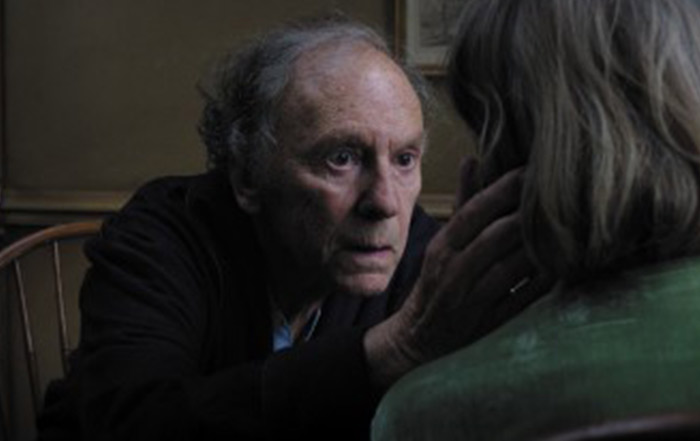AMOUR
Review by Rich Elias for the Drexel E-News
“Amour” is the last major Oscar contender to open in Columbus, rounding out the strongest group of nominees I’ve seen in years, even decades. This French film by the German writer and director Michael Haneke was a sure bet to win a spot in the foreign language film competition. The surprise is that “Amour” is also in contention for Best Picture. It won’t surprise me if Haneke takes home both Oscars, because “Amour” is definitely the most powerful and moving film out there.
Georges and Anne Laurent (Jean-Louis Trintignant and Emmanuelle Riva) are 85, living alone in their rambling Paris apartment, consoled by daily routines as advanced age engulfs them. One morning as Georges comments on a newspaper article he’s reading at breakfast, Anne quietly blanks out for a few minutes – a small stroke, followed by a week in the hospital, followed by her final decline at home. Not much happens in “Amour”. We learn little about their lives before this. They taught music, they have a bristly relationship with their grown daughter (Isabelle Huppert), the only mention of friends is when they discuss recent funerals.
It’s the ordinariness of their lives and the inevitability of their fate that gives “Amour” its intense emotional pressure. Haneke’s words and direction cut out anything that might distract us from his cool but sympathetic examination of their last days. In their uneasy encounters with their daughter, I kept thinking that Haneke wisely spares us from useless explanation. When Georges upbraids the daughter for interfering as Anne’s condition worsens, we see Haneke’s point: how burdensome it is to have to deal with someone else’s grief when your own is almost impossible to bear.
Riva’s performance received an Oscar nomination. She more than deserves the prize. At 85, Riva is the oldest actress to compete in that category. Her challenge was to find ways to keep us seeing her as an individual as she gets more feeble. In one brilliant scene, as Georges talks to her, Anne can’t reply – she can no longer speak – but her eyes make her meaning clear. Casting two stars of the French New Wave was a brilliant stroke for Haneke. Riva is best known in this country for “Hiroshima, Mon Amour” in 1959, more than a half century ago; Trintignant’s performance in “The Conformist” dates from 1970. When I first saw them together in “Amour” my first thought was, “Look how old they’ve gotten!” Then I realized that was the point of casting them as Georges and Anne. Seeing them again made me aware of how much time has passed, and how little there is left.
Rich Elias has reviewed movies for the Columbus Dispatch, WCBE-FM and the Delaware Gazette. He currently teaches Humanities at Ohio Wesleyan University in Delaware, Ohio.








